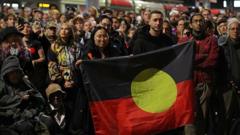Kumanjayi Walker, an Indigenous teenager, was fatally shot by police officer Zachary Rolfe in 2019. An inquest has revealed that Rolfe exhibited racist attitudes, leading to systemic racism within the Northern Territory police force. The coroner recommended significant reforms, emphasizing the need for anti-racism strategies and improved police conduct in Indigenous communities.
Inquest Reveals Racism in Police Force Following Shooting of Aboriginal Teen

Inquest Reveals Racism in Police Force Following Shooting of Aboriginal Teen
A coroner's inquest finds systemic racism in the Northern Territory police following the shooting death of Kumanjayi Walker, urging reforms to prevent further tragedies.
In a significant development regarding Indigenous rights and police conduct in Australia, a coroner's inquest has concluded that systemic racism was a major factor in the death of Kumanjayi Walker, an Aboriginal teenager shot by officer Zachary Rolfe in 2019. Walker, aged 19, died from three gunshot wounds inflicted during a home arrest in the remote community of Yuendumu, Northern Territory.
Judge Elisabeth Armitage's findings, presented on Monday in an open-air setting in Yuendumu, provide a critical look at Rolfe's behavior and the wider police culture. The inquest determined that Rolfe, who was acquitted of murder charges last year, possessed "racist" inclinations and had a tendency towards "adrenaline-style policing." Reports indicate that he worked within a police force characterized by "entrenched, systemic and structural racism."
During the inquest, more than 600 pages of findings were reviewed, revealing Rolfe's actions were not isolated incidents but representative of a larger issue within the Alice Springs police station, where derogatory language and conduct were reportedly normalized. While Judge Armitage expressed caution regarding the direct impact of Rolfe's racism on Walker's death, she acknowledged the possibility that his attitudes influenced the fatal encounter.
The incident occurred on November 9, 2019, during an attempt to arrest Walker for a prior incident where he had threatened police with an axe. Judge Armitage emphasized Walker's vulnerability, noting his history of trauma and lack of impulse control, arguing that police should have acted with greater caution. Rolfe’s decision to shoot Walker after a brief struggle, when Walker allegedly brandished scissors, raised questions of justified use of force, particularly as the situation escalated into a "chaotic" confrontation.
Rolfe fired three shots, with legal discussions during his trial focusing on the propriety of the subsequent shots fired after the initial impact. The coroner’s report highlighted Rolfe's attraction to combat situations and his failure to adhere to an established arrest plan provided by his colleagues. The inquest criticized the immediate post-shooting actions of the officers, citing the "disrespectful" manner in which Walker was handled after he was shot, which further fueled community outrage.
In response to the findings, Judge Armitage proposed 32 recommendations for systematic reform, including enhanced anti-racism strategies, public transparency regarding police compliance with these measures, and agreements to limit gun usage in Indigenous communities.
The inquest's closure was emotional, with Judge Armitage extending condolences to Walker’s family, who are now evaluating the proposed recommendations. Northern Territory Police acknowledged the painful journey of the inquest and committed to learning from the findings to prevent future tragedies involving Indigenous people in custody. As public outcries challenge systemic injustices, the call for accountability and change within law enforcement continues to grow.



















